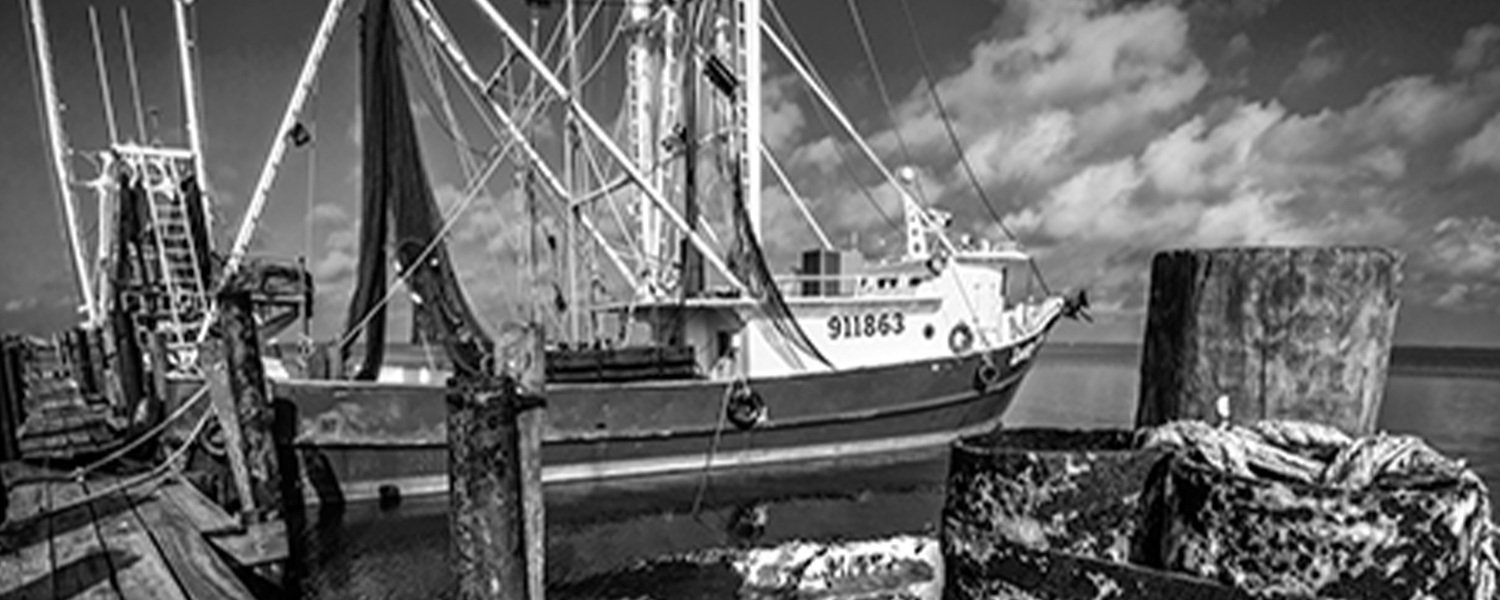Fishing is the Heart of National Shrimp Day
May 9, 2017

Fishing: a thing that’s been happening as long as there’s been an ocean. The human love affair with fishing dates back at least 130,000 years, but for the sake of brevity, I’m going to fast forward a bit.
Because May 10 is National Shrimp Day,
it’s the perfect time for a retrospective on the history (and importance) of fishing. Specifically, shrimp fishing.
Pause and take a moment to think about this: fish is our last wild food. We don’t roam the forests hunting for jumbo brown eggs, or spend days on the prairie waiting for the annual migration of the dairy cow. Don’t get me wrong—I love me some farms and without agriculture, our culture would literally not exist. But seafood, brought to us by men and women who go out on the ocean to catch it, is special. Though it may sound a little cheesy, eating wild seafood is one of the only ways you and I directly connect with nature anymore.
The foundations of that connection were first built hundreds of years ago. The wild shrimp fishery of the Southeastern United States has its commercial roots in the 1700s. Because shrimp can be caught close to shore, they’re plentiful, and they’re not going to fight a line like a tarpon. Anyone could wade out, toss a net and bring up a meal. (Importantly, note that the unique roux of the Gulf of Mexico and Mississippi river delta make shrimp delicious so back then it wasn’t, like, a hardship to have shrimp every night).
The ease with which shrimp could be caught made it ubiquitous; everyone fished for it.
So it was woven into the fabric of every family and town from Texas to North Carolina.
In the 1800s, shrimp made an important leap from the close-to-shore markets into locations further afield, thanks to magical technologies like drying and canning, and of course, railroads. Those crucial years between the 1880s and 1930s were what really cemented the shrimp industry into not just the culture of the Southeast, but the economy. Biloxi, that wee little city scrunched in the middle of Mississippi’s tiny coastline, used to be the Seafood Capital of the World, cranking out millions of pounds of shrimp every year. Like many of the coastal communities up and down the Gulf Coast, they were pint-sized, but had a disproportionately large impact. That’s actually kind of a great metaphor for shrimp.
These days Biloxi may no longer be the worldwide shrimp omphalos, but Southeastern fisheries are still vital, with the shrimp fishery one of the most valuable.
More than a quarter of the U.S.’s 100 most-profitable fishing ports are in the Southeast.
As I mentioned in another post, almost 80,000 jobs are tied to the Gulf States’ commercial fisheries, and the reason for that is, it’s an important industry! It has been for a long time, and I hope that we never take it for granted because it’s so easy to grab a bag from the freezer and ignore how it got there.
The most profound parts of the shrimp fishery aren’t something I can sum up with sources and statistics, though. It goes back to that connection with the wild, and to places and people who, for the love of it, have done the same thing for generations. I’m convinced that proud history lends an extra “oomph” to American shrimp, like how snuggling into your great grandma’s quilt feels extra comforting.
Usually, the grotesque proliferation of National Days celebrating every stupid thing from candied orange peels to argyle make me cringe, but I’m okay with National Shrimp Day. Maybe because it doesn’t feel trite. Unlike National White T-shirt Day, shrimp and fishing are parts of American culture you can taste, and that’s worth celebrating.
Suggested Articles
ASPA Fights Back Against Indian Shrimp Imports Made with Forced Labor
Port Arthur, TX (April 16, 2024) The American Shrimp Processors Association (ASPA) is taking aggressive action to combat imports of shrimp from India that were...
Read More April 2024American Shrimp Processors Association Launches Trade Petitions Addressing Unfair Dumping and Illegal Subsidies
Read additional information about the trade petitions, including public copies of ASPA filings. Today, the American Shrimp Processors Association (ASPA) filed trade petitions seeking antidumping...
Read More October 2023Bipartisan Legislation Introduced to Ensure the Availability of Healthy and Safe American Shrimp
WASHINGTON, DC – U.S. Representatives Garret Graves (Louisiana) and Kathy Castor (Florida) introduced legislation to stop unsafe, illegally-produced shrimp from reaching consumers. Much of the shrimp...
Read More August 2023

